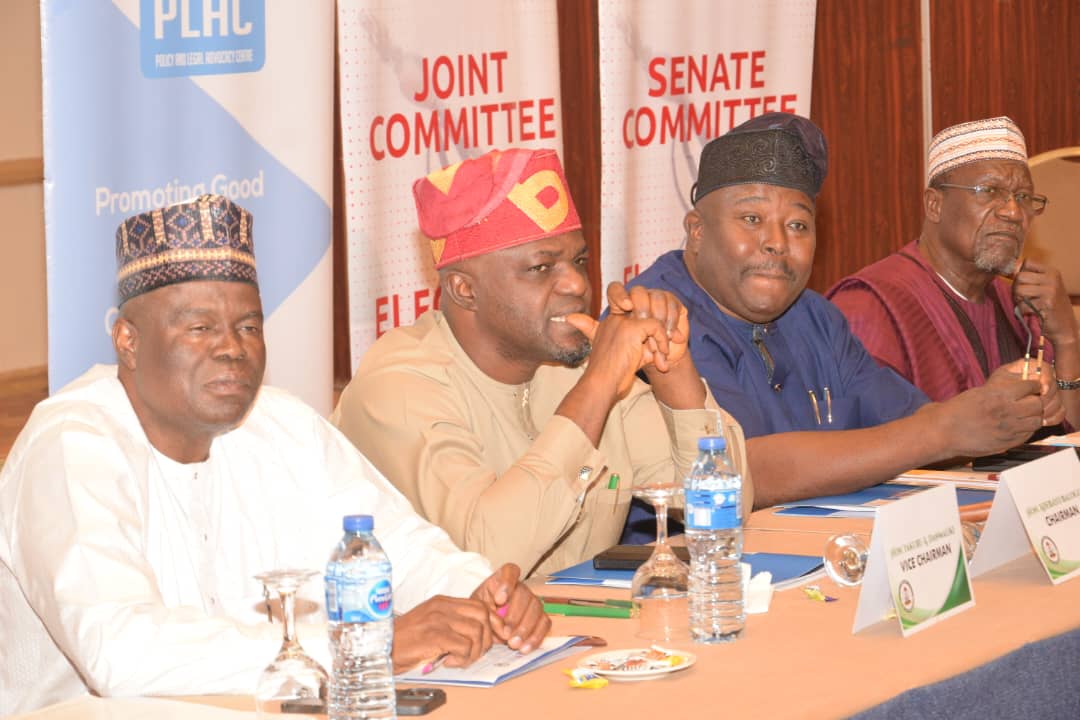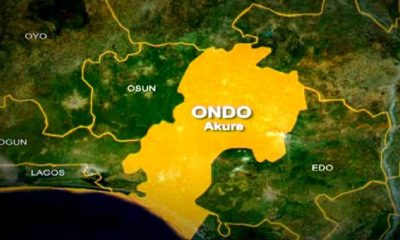News
INEC Call For Stricter Laws to Curb Vote-Buying at Polling Units

The Independent National Electoral Commission (INEC) has urged the National Assembly to pass tougher laws restricting the possession of large sums of money within polling areas to combat vote-buying and other electoral offences.
The Director of Litigation and Prosecution INEC, Tanimu Muhammed (SAN), raised concerns over vote-buying, describing it as a serious threat to Nigeria’s democracy, at a consultative meeting with security agencies and the technical committee on electoral law reforms on Friday in Abuja.
The meeting was organised by the Joint Senate and House of Representatives Committees on Electoral Matters, in partnership with the Policy and Legal Advocacy Centre (PLAC) and supported by the UK Foreign, Commonwealth, and Development Office (FCDO), and had key stakeholders in attendance to discuss electoral security and legal reforms.
Muhammed stated that politicians often claim they carry large sums on election day for party agent payments and logistics. However, he warned that unrestricted cash flow at polling units has encouraged vote-buying and undermined electoral integrity.
To tackle this issue, Muhammed proposed a legal limit of ₦50,000 for individuals within polling areas on election day.
The commission therefore called on lawmakers to focus on amending laws to eliminate loopholes frequently exploited by politicians.
INEC officials also renewed their call for the creation of an Electoral Offences Commission, stressing that the commission currently lacks the capacity to prosecute electoral offenders effectively.
News
Just in: Another major headache as 3 PDP senators defect to APC

Another major headache as three Peoples Democratic Party (PDP) senators from Kebbi, on Tuesday, defected to the ruling All Progressives Congress (APC).
According to reports, their letters of defection were read separately on the floor of the chamber by Deputy Senate President, Jibrin Barau, who presided over the plenary.
The senators are: Adamu Aliero (Kebbi Central); Yahaya Abdullahi (Kebbi North) and Garba Maidoki (Kebbi South).
Details…
News
Court Jails Two Six Months for Naira Abuse in Lagos

The Lagos Zonal Directorate 1 of the Economic and Financial Crimes Commission, EFCC, on Thursday, May 8, 2025, secured the conviction and sentence of the duo of Babatunde Peter Olaitan and Tobilola Olamide to six months imprisonment each for mutilation of the Naira notes.
They were jailed by Justice Alexander Owoeye of the Federal High Court sitting in Ikoyi, Lagos.
The convicts were arraigned on a separate one-count charge of tampering with the Naira notes and spraying, to which they each pleaded “guilty”.
The charge against Olaitan reads: “That you, BABATUNDE PETER OLAITAN, on 8th April 2025, at 23, Macdonald Road, Ikoyi, Lagos, within the jurisdiction of this Honourable Court, whilst dancing during a social event, tampered with funds in the denomination of N200 (Two Hundred Naira) issued by the Central Bank of Nigeria by spraying it, and you thereby committed an offence contrary to and punishable under Section 21(1) of the Central Bank Act, 2007.”
The charge against Olamide reads:”That you, TOBILOLA OLAMIDE A.K.A TobiNation, on 8th April 2025, at 23 Macdonald Road, Ikoyi, Lagos, within the jurisdiction of this Honourable Court, whilst dancing during a social event, tampered with funds in the denomination of N200 (Two Hundred Naira) issued by the Central Bank of Nigeria by spraying it, and you thereby committed an offence contrary to and punishable under Section 21(1) of the Central Bank Act, 2007.”
In view of their pleas, prosecution counsel, C.C. Okezie and H.U.KofarNaisa, respectively, reviewed the facts of the cases through Ibrahim Bukar, an investigative officer with the EFCC.
In his evidence, Bukar specifically told the court that the Commission, on April 10, 2025, generated an intelligence-driven investigation on TikTok, where Olaitan, also known as TDollar, was seen spraying Naira notes.
He also told the court that “Upon the approval of the intelligence by the Zonal Director, a letter of investigation was sent to the defendant, requesting him to make a statement regarding the video.
“The defendant reported to the Special Operations Team, SOT, on May 5, 2025 and his statement was recorded under caution.
“He stated that he went to a night club on April 8, 2025 and met some of his fans sharing money.
“ He also said that a fan, in the process, gifted him a bundle of N200 notes, which he sprayed on some of his other fans.
“He was shown a video of him spraying the money and he made a statement regarding it.”
Consequently, the defendants’ extrajudicial statements and video recordings were rendered and admitted in evidence by the court.
Okozie and KofarNaisa, therefore, respectively prayed the court to convict and sentence the defendants accordingly.
Justice Owoeye convicted and sentenced both Olaitan and Olamide to six months imprisonment each, with an option of fine in the sum of N200,000 (Two Hundred Thousand Naira.
The convicts’ road to the Correctional Centre started when they were arrested by operatives of the EFCC for Naira abuse. They were charged to court and convicted.
News
$1.43m scam: Ajudua on the run as Supreme Court orders his return to prison

The Supreme Court has ordered the immediate remand of Lagos-based businessman and socialite, Fred Ajudua, in connection with a $1.43 million fraud case dating back over three decades.
In a unanimous ruling delivered on Friday, the apex court overturned the decision of the Court of Appeal, which had earlier granted Ajudua bail.
The court held that the appellate court erred in its judgment and directed that Ajudua be returned to correctional custody without delay.
It was learned that Ajudua is now in hiding following the court’s decision.
“Ajudua escaped after the Supreme Court ordered that he should be returned to prison,”, a source disclosed and its currently unclear if he is still in Nigeria.
The case, which has spanned more than 30 years, stems from allegations that Ajudua defrauded a German company of $1.43 million through an advance fee fraud scheme—commonly referred to as a “419” scam in Nigeria.
A letter dated August 26, 1993, from the Embassy of the State of Palestine accused Ajudua of obtaining the funds under false pretence from one Ziad Abu Zalaf, a Palestinian businessman based in Germany. The funds were allegedly siphoned under the pretext of business transactions with Nigerian government agencies.
It was gathered that Ajudua and his accomplice, Mr. Joseph Ochunor, fraudulently collected sums of $268,000 and $225,000 from Zalaf on April 2 and May 12, 1993, respectively. They forged official documents, including receipts from the Central Bank of Nigeria and the Nigerian National Petroleum Corporation, to make the transactions appear legitimate.
Following an extensive investigation, a 12-count charge was filed against Ajudua before the Lagos State High Court in Ikeja. Initially arraigned before Justice Josephine Oyefeso, the case was later reassigned to Justice Mojisola Dada following a refiling of charges.
Ajudua’s lawyer, Olalekan Ojo (SAN), later approached the Court of Appeal, where a panel led by Justice Mohammed Garba granted bail on the grounds of constitutional rights and allowed the businessman to continue under his existing bail terms.
However, In its decision on appeal number SC/CR/51/2019, the Supreme Court, through Justice Chioma Nwosu-Iheme, ruled that the Court of Appeal acted outside its jurisdiction by granting bail after striking out Ajudua’s brief of argument for incompetence. The apex court held that any judgment or relief stemming from such a defective brief was legally void.
The Supreme Court further ordered that trial resume before Justice Dada of the Lagos State High Court without further delay.
-

 News23 hours ago
News23 hours agoGo home to face corruption probe, protesters in London tell Kyari (Photos)
-

 News19 hours ago
News19 hours agoUK unions slam Govt’s decision to end care worker visas
-

 News9 hours ago
News9 hours agoUS revokes governor’s visa
-

 News10 hours ago
News10 hours ago2nd Anniversary: Tinubu to commission Abuja International Conference Centre – Wike
-

 News25 minutes ago
News25 minutes agoJust in: Another major headache as 3 PDP senators defect to APC
-

 News18 hours ago
News18 hours agoSAD! Woman, child electrocuted in Edo
-

 Metro9 hours ago
Metro9 hours agoTension in Ondo community as herdsman dies in clash with vigilance group
-

 Sports18 hours ago
Sports18 hours agoBrazil appoints Carlo Ancelotti as national team coach

















